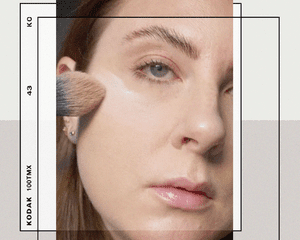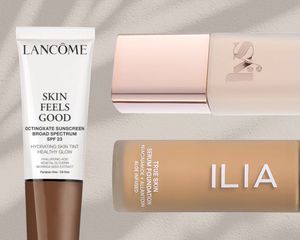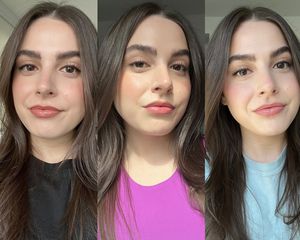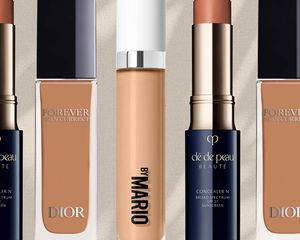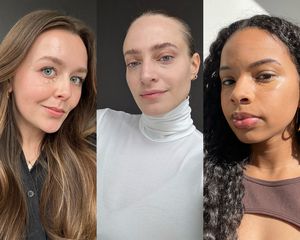:max_bytes(150000):strip_icc()/ScreenShot2022-12-09at1.14.48PM-e6cb8a29f00343e19b166f70e16372d6.png)
Dee Mills for Byrdie
Whether it's toning down an overly brilliant base, mattifying skin that produces its own sheen, or simply locking your look into place, the uses for face powder are infinite. And while applying it may seem intuitive to most beauty lovers, there are ways to get the absolute most out of your powder of choice. To learn more about how best to apply powder, we asked professional makeup artists Anthony Nguyen and Katie Mellinger. Keep reading to learn how to apply face powder like a pro makeup artist.
Meet the Expert
- Anthony Nguyen is a celebrity makeup artist and KVD Beauty global veritas artistry ambassador.
- Katie Mellinger is a celebrity makeup artist whose clients include Emma Watson, Michelle Yeoh, and Stephanie Beatriz.
:max_bytes(150000):strip_icc()/The-Right-Way-to-Apply-Face-Powder-1a54db60ef9040d087bc2b94decb1f78.png)
Byrdie | Design by Zackary Angeline
Picking the Right Powder and Brush
When it comes time to choose a setting powder, you're going to want to have clear goals in mind. "It’s important to know how much coverage you’re looking for, what type of consistency you prefer— whether pressed or loose—and what type of finish you want, whether it be matte, natural, or radiant," says Nguyen.
For a matte finish, Mellinger's "old reliable favorite" is Ben Nye's Neutral Set: "It looks good on everybody," she exclaims. She also reaches for LYS Beauty's Triple Fix Translucent Pressed Setting Powder. "I love that it contains niacinamide, which minimizes pores and wrinkles and helps reduce pigmentation," she says. Nguyen recommends the KVD Beauty Lock-It Setting Powder "because it fully sets your makeup all day, no flashback." For something closer to the natural/radiant end of the spectrum, try Koh Gen Do's Manifashi Face Powder. "The mill is super fine and it is colorless without mica," says Mellinger.
The tools you use will also dictate your outcome. “Choosing the right powder brush is key because it really makes a difference in your application, and depending on your tool, it can create different finishes," says Nguyen. "I personally love a large, dense brush so that I can gently press and tap onto large areas of the skin and have it set evenly.” His pick? The KVD Beauty Lock-It Setting Powder Brush #20. "It’s soft, gentle, and picks up the perfect amount of product every time for flawless application," he says.
How to Properly Apply Face Powder
Step 1: Pour Powder Into the Lid
:max_bytes(150000):strip_icc()/face-powder-1-9b3a0d37afca43e6b1f5ec3c8b0fbecd.jpg)
Dee Mills / Byrdie
There are a few ways to use setting powder: You can set your entire face to increase your wear time, focus on your t-zone to keep oil at bay, or set specific makeup products that are more likely to fade throughout the day.
And what you're applying powder for will dictate when you apply it. "In general, powder should be applied at the end of an application; however, it can be used throughout the application if you want to set certain things," says Mellinger. "For example, I will use it to blend out shadow on the eye while I’m working even though I haven’t done the foundation yet. Or sometimes you can use a lot of it under the eyes while you’re working to catch [fallout from] eyeshadow. But if you’re using it to set, I would recommend it at the end of the application."
When you are ready to apply, pour a little bit of your powder into the lid of the container and lightly swirl your brush.
Step 2: Pick up the Powder and Tap Off Any Excess
:max_bytes(150000):strip_icc()/face-powder-2-969cfc5c02ae45e690ab6156806e4679.jpg)
Dee Mills / Byrdie
Before you go in on your face, you'll want to tap the brush on the side of the container to remove any excess. “Tapping your brush before applying powder helps prevent using too much product," says Nguyen. "If you apply too much powder, it can accentuate dry areas and fine lines on the face.”
Step 3: Add Powder to Your T-Zone
:max_bytes(150000):strip_icc()/face-powder-3-2a4044747b034790a44ddfea83638852.jpg)
Dee Mills / Byrdie
Whether you're new to powder or old hat, starting the application on the forehead is probably your best bet. "Product is always denser the first place you lay it on the face, so starting on the forehead, nose, and chin, where people tend to get shiniest, is useful," says Mellinger.
Step 4: Add Powder to Your Chin
:max_bytes(150000):strip_icc()/face-powder-4-161bf2cd51624a2bb514df360f1e7b49.jpg)
Dee Mills / Byrdie
If your goal is to control shine and oil, make your way down from your forehead to your chin, powdering your nose in the process.
Step 5: Add Powder to Your Cheeks (If Needed)
:max_bytes(150000):strip_icc()/face-powder-5-423ca507fccd4eaebc4ede5e68ea4ed7.jpg)
Dee Mills / Byrdie
If your skin is dry, combination, or balanced, you can likely skip powdering your cheeks; chances are your makeup will stay put on its own. Those with oily skin might want to go in with a layer of powder over their blush and contour, however, to keep things in place.
Step 6: Final Look
:max_bytes(150000):strip_icc()/face-powder-6-8e907a6814ae4138a92a4c977373378b.jpg)
Dee Mills / Byrdie
When it comes to maintaining your look, our makeup artists generally recommend eschewing more powder and reaching for blotting products instead. “I like using blotting powders throughout the day to remove shine without adding extra products, and then only using powder again for touch-ups when absolutely necessary,” Nguyen emphasizes.
